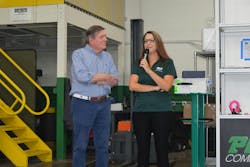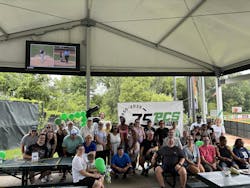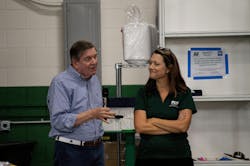Jim Stuart carries PCS legacy
Key Highlights
- Jim Stuart joined his father's company, PCS, in his 30s and helped expand its business by introducing mold bases and diversifying product offerings.
- He emphasizes the importance of embracing new technologies like AI and 3D printing to stay competitive in manufacturing.
- After his retirement from PCS, Stuart remains actively involved as a consultant and advisor, sharing his expertise and industry insights.
- His startup, Red E Innovations, offers the Red E Vault, a device for storing mold data securely and efficiently, reflecting his innovative spirit.
The second-generation owner of a business that has seen the plastics industry grow up around it can’t sit still enough to watch daytime TV, now that he’s retired.
Instead, Jim Stuart enjoys time with his grandkids, boating and the occasional lunch at PCS — the offshoot of the business, R & S Tool, his father, James Stuart II, and a friend, Joe Ramsey, started 75 years ago — where he can still dish out advice, even years since he and his own partner, Jim Ramsey, sold their stakes. Stuart pushed the company named for Pins, Cores and Sleeves to begin selling mold bases — a decision that helped it capture customers interested in everything mold-related, from the big one-off investment to all the components a mold maker needs to be able to turn out tooling.
In an interview with Karen Hanna, senior staff reporter for Plastics Machinery & Manufacturing, he discussed PCS and his own retirement project, Red E Innovations.
How did PCS come about?
Stuart: My father and his partner, Joe Ramsey, started PCs. They had a business before that, called R&S Tool … a manufacturer of cutting tools … basically die cast, and sold them in that industry in the infancy of plastics. The first product they had was ejector pins and manufactured them in a plant they built and controlled.
They wanted to find out if [their] sons wanted to get into the business. My dad's partner's son was a pharmacist. I [worked for] 3M Co. for 10 years in the automotive aftermarket side. The deal was, if we were to come on board, we both had to work in the back of the shop for a year to learn manufacturing and all the things that made the ejector pins they were selling the best in the industry. After that year, I was able to get up front. My dad was the marketing and sales man for the company, and I was able to help him, got on the road and made sales calls and ended up expanding the products.
How old were you when you joined PCS?
Stuart: In my 30s. After college, I wanted to get into another industry. I had worked with my father and Joe every summer. [Being] his son, working for the business, he was always on my back to do this and that. “You can't take breaks, you can't smoke in the back of the shop. …” I wanted to prove to him I could go out on my own. That's where the 10 years with 3M taught me a lot more than I could [learn] just by working for them.
Looking back, what do you think of your experiences working with your father?
Stuart: When I was in the summer working for him, I just wasn't one of the employees; I had to be the shining star. It was beneficial, but going through it was different.
When you joined PCS, how big was the business?
Stuart: $860,000. When I sold the business, we were doing … maybe 21-22 [million dollars]. I started in ’80. We sold the business after 20 years [around 2000]. We hadn't planned on selling, but Dayton Progress, which is owned by Federal Signal, came to us. Dayton Progress made steel punches, and they wanted to expand opportunities, because their sales guys were on the road all the time, selling pretty much to the same type of people PCS handled. Unfortunately, at the time, my partner's health wasn't great. It was a good opportunity for both of us.
How would you describe your role with PCS now?
Stuart: I'd say hanging around because I enjoy it. I'd like to be a consultant, but a lot of people here, they're smart people. PCS is doing very well. If I can be here to answer questions and do some things, I'm more than happy.
If I look at something or see some of the products that might be coming out, I might give suggestions. Some of the advertising has become very, very good, [but] needed some work in the beginning. I was able to help them on some of those things. I know the stuff, how ejector pins are made, and I was in the industry long enough to give advice on some of this stuff. But things are changing quickly, and some of this, it's not how we used to do it. I think it's probably better the way they're doing it now. I wish I had some of the technology and some of this other stuff, because I could have done a lot with it.
I am not sitting around watching “General Hospital,” that's for sure. I like the business. I like to talk to the people. I'm still very interested in the industry.
I don't like to sit around. I like to do something.
A friend of mine retired, went crazy, and he ended up painting the house and doing all kinds of stuff on it, which I did a little bit when I retired. He called me up and says, “Well, I'm all done with this. What am I doing to do now?” And I said, “I told you, ‘You better pace’ yourself.” Other people can go out and play golf, but that's not the way I like to live.
I'm not coming here every other day. If I have a suggestion or idea, I call the appropriate person. They say that, “We don't want that guy to show up here all the time,” so I don’t do that. I don't want people to resent me and say, “He knows this, he knows that,” or “He doesn't know this, and he doesn't know that.” You’ve got to be careful. [It’s] their business, not mine.
The bigger it gets, the better I feel that they were able to take what I started and my dad started and build it into where it is now. They're still going at it. I think they’re in an enviable position as onshoring becomes more prevalent to be a leader in the industry.
What technology advances stand out to you over the years?
Stuart: Everybody's going to say AI. I believe the ones that embrace that are going to be ahead. I don't think there's a specific way of it being used. I think it's going to [be], press a button and say, “How do we do this better?” They’re using AI in the shop floor to maximize their input and output. I don't think I would want to have AI answering the phone, but I think technology-wise and the shop [but using it to find] more expeditious ways of handling internal programs.
I think this new technology — 3D printing, like Mantle and some of these other companies — that's going to revolutionize how quickly you can come to the market and eliminate labor. Of course, that's what we're trying to do in this country: Keep it on shore, but still be competitive with the people that have a big labor-cost advantage. To onshore sounds good, but who's going to do it? I think these tariffs are going to be good for our country, because [they] force people to [go to] companies that manufacture here, and it's going to give our manufacturing maybe not an advantage, but at least an even playing field. But they should take some of those tariffs and … that money and put it into trade schools, give mold shops some tax advantages on equipment so they can upgrade their equipment in order to be competitive.
It's not just the mold industry, of course. The other industries, they're in the same boat. Where are those guys that had the technology? Where we going to pick up that information? You just can't do it very quickly. Some of this stuff that's going to come here, even though they want to bring it back, they don't have the people to do it.
If you have a business, no matter, it all boils down to labor. The greatest day of our lives when Jim and I had PCS is when we were able to hire a human resource person so they could take care of all the crazy stuff that came to our front door. If a shop wants to go on buy a Makino, he can go on and buy a Makino if he's got enough money, but he can't go out and [hire] some kid, that's a lot harder.
You’ve got to have steel, you’ve got to have a machine that removes the steel. You’ve got to have somebody that [can] put that thing together, and you’ve got to have a programmer that knows what they're doing. I would assume pretty soon AI is going to be able to do some of that for everybody. But the mechanical part of the stuff that you have to have two hands for, that's where you're going to have to figure out how we can get more people to do that kind of work.
Does 3D printing represent competition to companies like PCS?
Stuart: It’ll be a competition to some companies, but it won't be competition to people that sell the components. What it does, it takes a lot of prototyping and things like that that might have been done overseas, and now we can do it here. With 3D printing, people still have to buy ejector pins, people still have to buy leader pins, people have to buy all that stuff. Even [if] a printer could make this stuff fairly inexpensive, you can buy it cheaper because, rather than making four leader pins for this one particular tool, you [can] buy it from PCS that buys thousands of leader pins.
Can you tell me about your business, Red E Innovations?
Stuart: It’s very small. After retiring, I ended up thinking, “What can I do? What should I do?” I've been in meetings where we'd be talking about a new product, and somebody would open the door, [and] say, “Fred, we got a tool down. We need to know what leader pin we need.” Everybody made a paper manual. I said, “There's got to be a better way.” It’s called the Red E Vault, [which] stands for Retrieve Electronic Data Easily.
It's a USB [drive], but it's impervious to some of the molding issues. It's got a heat limitation, of course, but we can keep water and oil out of it.
It’s made to be put on the mold, so, when the mold builder builds the mold, now that's the owner's manual. You get a 10-foot cable and plug that cable into the Red E Vault, and you plug it into your laptop. You can store pictures of how it might be set in the molding press and things like that.
How long has that business been going?
Stuart: 10 years.
How many molds have Red E Vaults?
Stuart: I wish I could say everyone, but I would say maybe 5,000. It doesn't take me all my time, but it's nice to have a little business like that.
How many employees work for Red E Innovations?
Stuart: You’re looking at it. PCS sells it for me.
I haven't really changed the design because the only way to change something like that and make it more interactive is you’ve got to put a battery in it. I could do a lot of crazy things with it, but sooner or later, you’ve got to change the battery, and sooner or later, you’ve got problems with batteries. We can even see it with people [talking about] Tesla, saying, “Well, that's a great car, but the battery’s not going to last that long.” So, I'm sticking to my guns and saying, “Listen, if you want to know about the information in that mold today, you plug it in. You want to know about that information on that mold 20 years from now, you plug it in.” I don't have to worry about somebody calling me up saying, “My battery died on me.”
What else do you like to do in your spare time?
Stuart: I try to be involved as much as I can with my grandchildren. I like to boat. I don't have a boat now, but as they say, the best boats are friends’ boats. I live at Lake St. Clair. When I was growing up, my dad had sailboats, and we would sail all the time. That was an enjoyable part of my life.
When you look over the past 40 years at PCS, what makes you most proud?
Stuart: We started with the dads, and we worked. We really worked hard. We always looked for new products, and we brought a lot of nice products to market. We had a good business, built it up very quickly, never had to borrow money, and the people that worked here liked working here.
What do you think your father would think of the business now?
Stuart: I would assume he would be very proud. I kept saying, “Dad, we need to add new products. … I know I can sell it.” So, we kept adding new products, and we sold them. I think he’d very happy at what it turned out to be.
What would you want your legacy to be?
Stuart: We built the business for 20 years, built it very fast, very well. Jim and I tried to have an atmosphere that people enjoyed working for us. I'm very proud those people liked working for us. We got things done.
Unfortunately, I'm the last man standing. My dad passed away, and Joe maybe about three years after him. My partner ended up having MS. He passed away maybe five years ago.
When I first started, plastics just started really going into not just die casting, but plastics. My dad liked to make sales calls, and sometimes we talked to the guys in the back of the shop. We saw a lot of people come to our front door and say, “I work for so and so, and I want to start my own business.” It was pretty easy at that time to start their own business, because the cost of machinery wasn't so sophisticated and expensive.
We would see those guys grow and grow and grow, and then what would happen a lot of times, that guy had his business, and he'd have children, and the children got into the business, and the business was being run fantastically. And the father says, “Well, I think I'm going to retire, I'm going to go to Florida or something like this.” All of a sudden, the children are left to run the business. Well, that was a problem, because one says, “Who's going to be the president? Well, I should be the president.” “Well, no, I should be the president.” A lot of times, those businesses failed.
I think the way we were able to take care of that, where we were a second generation, and going from there was something we should be proud of, that we were smart enough not to be envious of the other one. We both liked to work, and so we both showed up.


